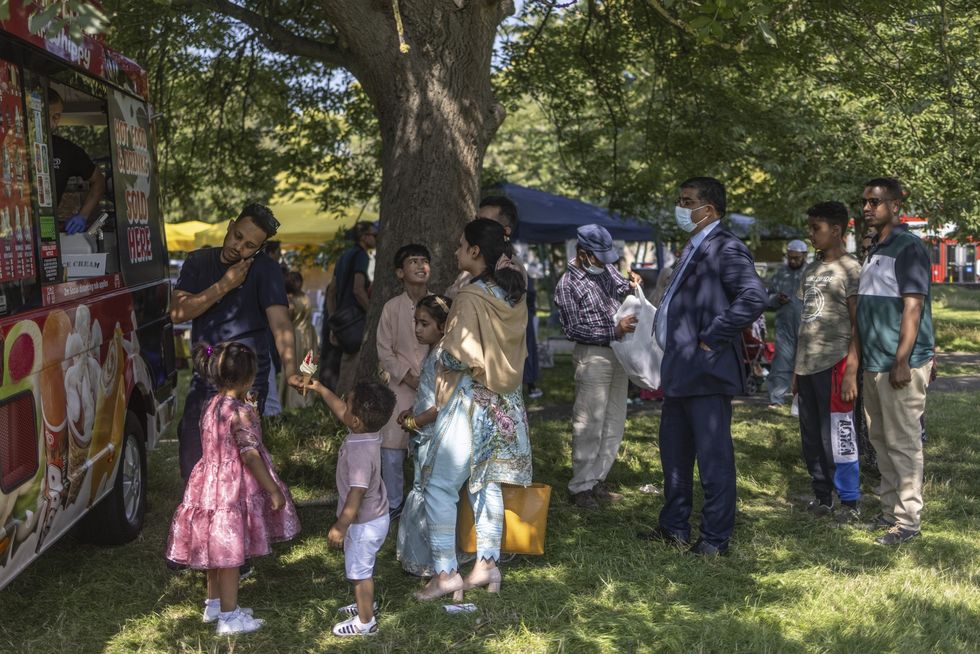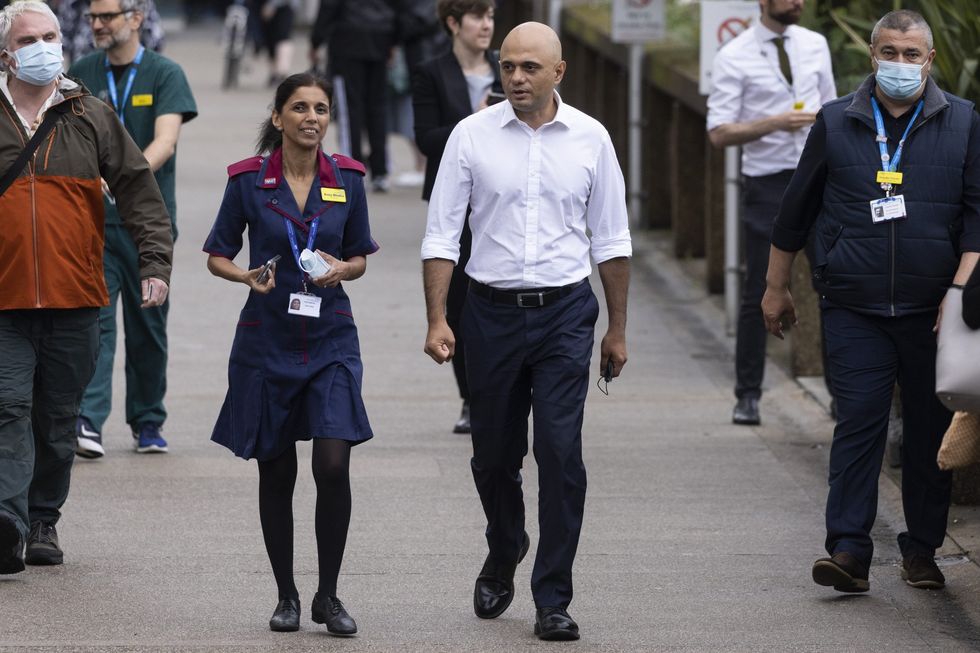Figures reveal four in 10 British-Pakistanis still unprotected
The health secretary, Sajid Javid, has told Eastern Eye that he is “very concerned” that three in 10 south Asians remained unprotected against Covid.
During a meeting of specially invited non-white press and broadcasters, Javid revealed that among British-Pakistanis the take up of the vaccine at the end of August was 55 per cent.
“I'm very concerned,” he said. “We know that vaccines work and overall [Britain] has been a leader in vaccine uptake, but it's been uneven.
“If you look at it on a community basis, the British Asian community and look at it this way that the nationally the uptake is around over 80 per cent for a double dose.
“In the British Indian community [it] is about 70 per cent, of the British Pakistani community, it's about 55 per cent.
“It's improved a lot in the last couple of months, but I want to certainly encourage more people to take up the offer of a vaccine.
“If you're eligible, please take it because we know it saves lives when it protects those people around you, not just those who are taking the vaccine.”

Javid paid tribute to the hard work of NHS staff, but he knows that the government is not getting its message to vaccinate through to some minority communities.
“Black minority ethnic communities represent roughly about 14 per cent of the population of the country, but they represented a third of critical care admissions to do with Covid,” he said.
“That one number encapsulates the disproportionate impact it had on those communities.
“There's been the amazing vaccination programme that we've had, but when you look at the people that haven't been vaccinated, we estimate that's about 5.3 million people in the UK that have not yet taken up their offer of vaccination.
“That's a huge number, and when you dive deeper into that number, a disproportion of those that haven't taken it up are from black minority ethnic communities, and also younger people as well.”
Lack of trust
That is why he set up a meeting with minority journalists and publications to discuss ways to reach Asian and black communities.
When Javid asked why the government was failing to engage some minority groups, journalists responded that some Asian and black communities did not trust the administration.
It was a message reinforced by Dr Chaand Nagpaul of the British Medical Association (BMA).
The chair of the doctors’ union told Eastern Eye, “It's really important to recognise that Sajid Javid is the first ethnic minority secretary of state for health and social care.
“That gives him an incredible opportunity to demonstrate that he understands the issues affecting our ethnic minority population, as it relates to health, as well as the ethnic minority workforce.
“But you know what, the low uptake of vaccines is very much related to the level of trust communities have in higher level messaging.
“That's why I think it's so important that his first [message] must be to say that I can be trusted, and you demonstrate that trust by being very open and clear about the issues that affect everyone.”
Dr Nagpaul called on the health secretary to be clear that some of Britain’s health inequalities were caused by racism.
“One of the real important points that he needs to make is that he recognises that society is afflicted with racism, it is afflicted with inequalities.
“The sad fact is that the government at large is not using this language, it's not being open and clear about these inequalities.
“It's using words like disparities, rather than inequalities, that doesn't really mean a lot to the lay person. It has produced reports that even deny that structural racism exists.
“I think it's so important to be open about these things. Because by acknowledging it, by being open, you can then show that you're determined to change, people can then trust you.”

Journalists also told the health secretary that the government’s messaging was mixed and contradictory.
It is a view shared by doctors’ leaders.
“The government is pushing, rightly, the public to take up the vaccine, it's doing so because it knows Covid is still out there as a real virus circulating at high levels,” said BMA chair, Dr Chaand Nagpaul.
“On the other hand, if it tells the population that you don't need to be taking any precautions to stop spreading the infection, you don't need to wear masks, you don't need to be [socially] distanced, you don't have to have ventilation, it does send a mixed message.
“It wouldn't take a lot to be like many other European nations, which is to have simple requirements, that when you're in a taxi, whether you're on public transport, or whether you're in an enclosed surrounding, like a shop, that in fact, people should pay attention to wearing masks to prevent spread from one person to the other.”
The health secretary has rejected the idea of making the wearing of face masks mandatory.
“We listen to a lot of different voices, and it won't surprise you that not everyone agrees on what are the best measures to take,” said Javid.
“But I will tell you one thing that everyone agrees on, whether it's the BMA, its scientific advisors, its numerous other organisations, and that is the power of the vaccine.
“The vaccine works. It is saving lives at 25 million fewer infections because of the vaccines.
“There are 200,000 or fewer people in hospital because of the vaccines, 126,000 fewer deaths, because of the vaccines, and that really has got to be our central message.
“That is our way to some point in the future to say goodbye to this pandemic forever.”
Target right people
Journalists also questioned whether the government was targeting the right people among non-white communities.
“One thing that I've got a bit of a bug bear about is how the media talk about ‘community leaders’,” said one south Asian reporter.
“As a younger British Asian, I've never followed a community leader. Maybe my parents have those leaders, but with younger British Asians, we don't have the same trusted figures as our parents do.
“So, who are these people actually being influenced by? Is it social media influencers? Is that who you need to be partnering up with and reaching?
“Maybe you need a slightly different approach with the younger ethnic minorities.”
The health secretary said the government was using social media, and that he was keen to look at different ways to get the government’s messages to minority communities.
But Javid was scathing about some social media influencers, such as pop-star Nicki Minaj and, what he called, her “ridiculous Tweet”.
The rapper Tweeted the vaccine caused impotence.
“Obviously, there is a sadly, a lot of misinformation out there,” he said.
“Nicki Minaj said really nonsense things about the vaccine, and when I was doing media, the next day, I was getting asked about that.
“When I finished the interviews, some people said to me why don't you condemn her?
“That's what she wants, right? And I don't actually want to give her what she wants. I don't want to draw traffic to this bad message she's sending out.
“So, we're always trying to find what's the best way to deal with situations like that.”
Analysis
Our analysis suggests that the number of south Asians taking up the offer of two doses, and so being fully protected, rose month-on-month since the start of the year.
By the end of September, more than 2.5 million had been doubled vaccinated. That was an increase of almost nine per cent on the 29 August figure.
https://public.flourish.studio/visualisation/7438699/
Since the start of the year, British-Indians aged 18 or over continued to be the community which most took up the government’s offer to be fully protected.
As of last Thursday (26 September), British-Pakistanis still lagged behind with just 60 per cent taking two vaccinations, compared to 75 per cent and 70 per cent for British-Indians and British-Bangladeshi respectively.
“The most important thing is to take your primary dose, and the evidence shows once you have had your primary dose, you're more likely to come back for your booster,” said the health secretary, Sajid Javid.
“You've really got to convince them that it's a good thing to do, to keep something away rather than when it's in your face, and so that's a challenge.
“If they've had six months since their primary dose, it is time to really start taking the booster.
“The older they are, or if they've got underlying health conditions, it becomes even more important.”
For the BMA chair, Dr Chaand Nagpaul convincing people to take the vaccine relies on the government making sure its messages are effective, especially among younger groups.
“As we speak, there are about 35,000 new cases every single day, and that's an underestimate, that's reported cases,” he said.
“People are falling ill, they are going to hospital, family members are being affected.
“The communication needs to be owned by those younger age groups, and the government needs to pass on the baton and provide support for that messaging to actually be co-owned by the younger age group, using tools like social media, Instagram, Twitter, and so forth.”
Community pharmacies
Community pharmacists have told Eastern Eye that they have felt ignored by the government. But the health secretary paid tribute to them and promised to make sure they were not left feeling under appreciated.
Speaking the Eastern Eye, Sajid Javid said, “The first thing I would say [is that] community pharmacies have done an absolute amazing job over the entire pandemic right from day one.
“Community pharmacies were first when they went on the front line. They stayed open when many other businesses understandably had to close because they're more than a business.
“They are part of your community, serving critical needs, but especially during the pandemic. “Not just with what they were providing, whether that would be masks or helping in other ways, but also giving advice to a country that was shocked at the start of the pandemic – we didn’t have the answers.
“So, I can't thank community pharmacists enough for what they've been doing throughout the pandemic when it comes to helping, whether it's with vaccination programme, or in other ways.
“We absolutely need to make sure that they're getting the support that they need. We constantly keep it under review. “I meet with community pharmacy leaders, as does my office, and I think that dialogue is important to make sure that we're listening to them and doing everything we can.”






 Nirmala Sitharaman speaks at the India-UK Investor Roundtable in London last Wednesday (9). On the panel were India’s department of economic affairs secretary Ajay Seth and Kotak Mahindra Bank founder Uday Kotak
Nirmala Sitharaman speaks at the India-UK Investor Roundtable in London last Wednesday (9). On the panel were India’s department of economic affairs secretary Ajay Seth and Kotak Mahindra Bank founder Uday Kotak Sitharaman with Sir Keir Starmer and Rachel Reeves
Sitharaman with Sir Keir Starmer and Rachel Reeves Sitharaman with Jonathan Reynolds
Sitharaman with Jonathan Reynolds  Sitharaman with Reynolds, Alastair King, India’s high commissioner Vikram Doraiswami and other delegates
Sitharaman with Reynolds, Alastair King, India’s high commissioner Vikram Doraiswami and other delegates












